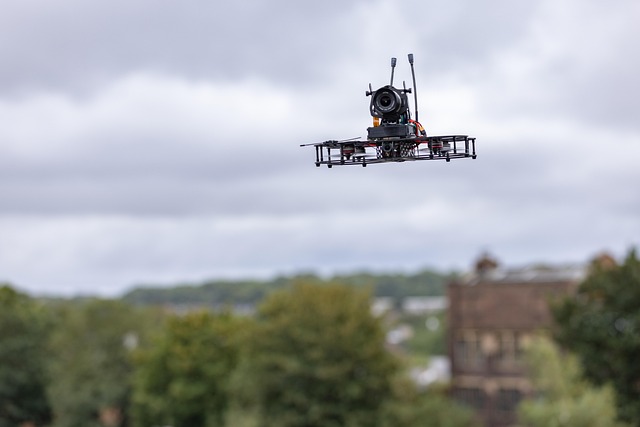How to Work as an Industrial Inspection Drone Operator
As industry increasingly relies on data obtained through aerial photography, inspection drone operators are in high demand. Learn how you can enter this exciting field, from training to practical application. And acquire one of the most sought-after skills right now. Read the article to find out all the benefits!

What are the top jobs for drone operators in Canada?
In Canada, the drone industry is rapidly expanding, offering various opportunities for skilled operators. Industrial inspection is one of the most prominent sectors, but it’s not the only one. Some of the top jobs for drone operators in Canada include:
-
Infrastructure inspection (bridges, buildings, power lines)
-
Oil and gas pipeline monitoring
-
Agricultural surveying and crop assessment
-
Mining and quarry mapping
-
Environmental monitoring and wildlife surveys
-
Real estate photography and videography
These diverse roles showcase the versatility of drone technology and the growing demand for qualified operators across multiple industries.
How do industrial inspection drone operators work?
Industrial inspection drone operators use unmanned aerial vehicles (UAVs) equipped with high-resolution cameras and specialized sensors to inspect and gather data on various structures and facilities. Their typical workflow includes:
-
Pre-flight planning: Assessing the site, checking weather conditions, and creating flight plans.
-
Equipment setup: Preparing the drone, cameras, and other necessary tools.
-
Flight execution: Piloting the drone to capture images and data according to the inspection requirements.
-
Data collection: Ensuring all necessary footage and information are properly recorded.
-
Post-flight analysis: Reviewing collected data and preparing reports for clients or supervisors.
Operators must adhere to strict safety protocols and regulatory guidelines throughout their work to ensure compliance with Canadian aviation laws.
Who should become an industrial inspection drone operator?
The ideal candidate for this role possesses a unique blend of technical skills and personal qualities. Those who may excel in this field often have:
-
Strong spatial awareness and hand-eye coordination
-
Attention to detail and analytical thinking skills
-
Interest in technology and willingness to learn new systems
-
Problem-solving abilities and adaptability
-
Good communication skills for client interactions and team collaboration
Additionally, individuals with backgrounds in engineering, photography, or aviation may find their skills particularly transferable to this role. However, with proper training and dedication, people from various professional backgrounds can successfully transition into this career.
What are the benefits of working as a drone operator?
Working as an industrial inspection drone operator offers numerous advantages:
-
Growing job market: The increasing adoption of drone technology across industries ensures a steady demand for skilled operators.
-
Diverse work environments: Operators often work in various locations, from urban settings to remote industrial sites.
-
Competitive salaries: As a specialized skill, drone operation can command attractive compensation packages.
-
Technological advancement: Operators stay at the forefront of emerging technologies and industry innovations.
-
Environmental impact: Drone inspections often reduce the need for manned aircraft, contributing to lower carbon emissions.
These benefits make drone operation an appealing career choice for those seeking a dynamic and future-proof profession.
What are the work conditions for an industrial inspection drone operator?
Industrial inspection drone operators typically experience varied work conditions:
-
Outdoor work: Most operations take place outdoors, exposing operators to different weather conditions.
-
Travel requirements: Depending on the employer, frequent travel to inspection sites may be necessary.
-
Flexible schedules: Work hours can vary based on project needs and optimal flying conditions.
-
Physical demands: Operators must be able to carry and set up equipment, sometimes in challenging terrains.
-
Safety considerations: Adherence to safety protocols is crucial, especially when working around hazardous industrial sites.
While the work can be physically demanding and require adaptability, many operators find the variety and challenges of the job rewarding.
How can one start a career in industrial inspection drone operations?
To embark on a career as an industrial inspection drone operator in Canada, follow these steps:
-
Obtain a drone pilot certificate: Complete Transport Canada’s basic or advanced operations course and exam.
-
Gain practical experience: Practice flying drones and familiarize yourself with various models and controls.
-
Acquire specialized training: Enroll in courses focused on industrial inspection techniques and data analysis.
-
Develop industry knowledge: Study the sectors you’re interested in, such as infrastructure, oil and gas, or agriculture.
-
Build a portfolio: Document your flights and projects to showcase your skills to potential employers.
-
Network and seek opportunities: Attend industry events, join professional associations, and apply for entry-level positions or internships.
| Training Provider | Course Type | Duration | Cost Estimate (CAD) |
|---|---|---|---|
| Canadian Centre for Unmanned Vehicle Systems | Advanced Drone Pilot Training | 5 days | $2,500 - $3,000 |
| Humber College | Drone Operator Certificate | 12 weeks | $3,500 - $4,000 |
| SAIT (Southern Alberta Institute of Technology) | UAV/Drone Pilot Ground School | 40 hours | $1,500 - $2,000 |
| DroneU | Industrial Inspection Specialization | Online, self-paced | $1,000 - $1,500 |
Prices, rates, or cost estimates mentioned in this article are based on the latest available information but may change over time. Independent research is advised before making financial decisions.
Becoming an industrial inspection drone operator offers a promising career path with opportunities for growth and specialization. By combining technical skills with industry knowledge and practical experience, aspiring operators can position themselves for success in this dynamic field. As drone technology continues to advance, the demand for skilled operators is likely to grow, making it an excellent time to consider this exciting profession.




